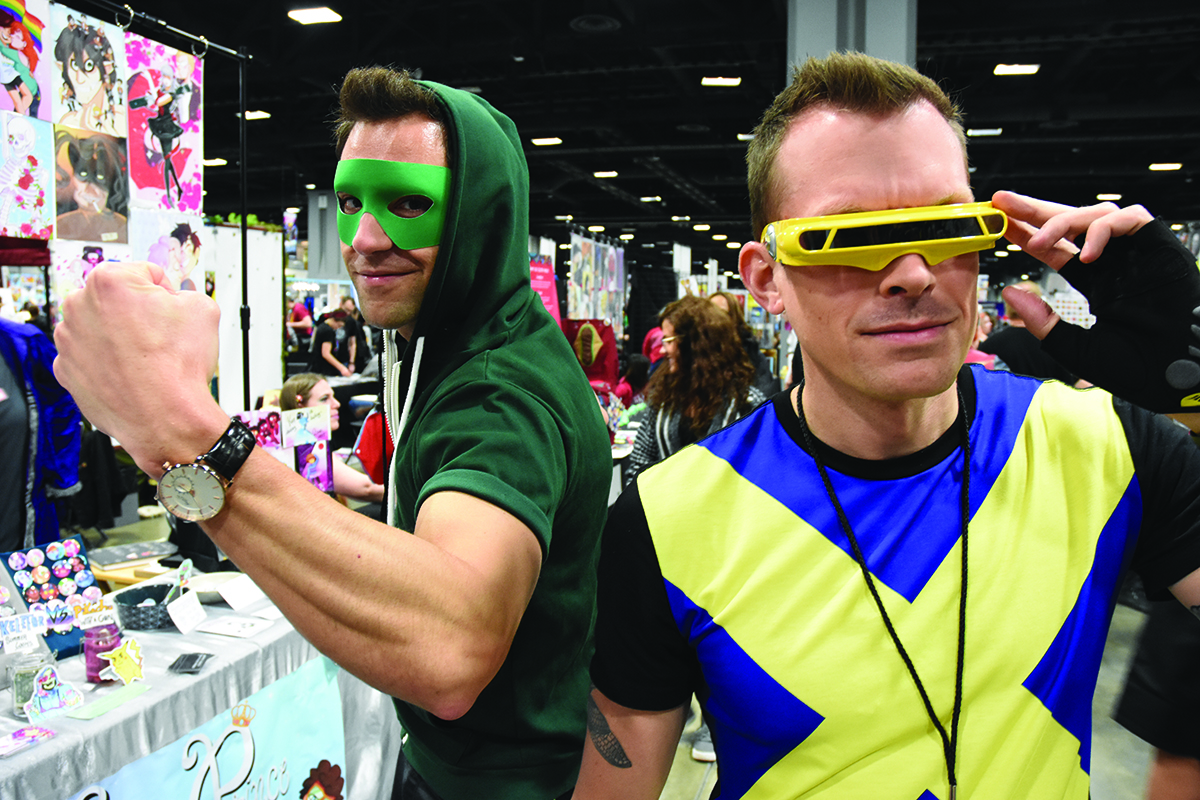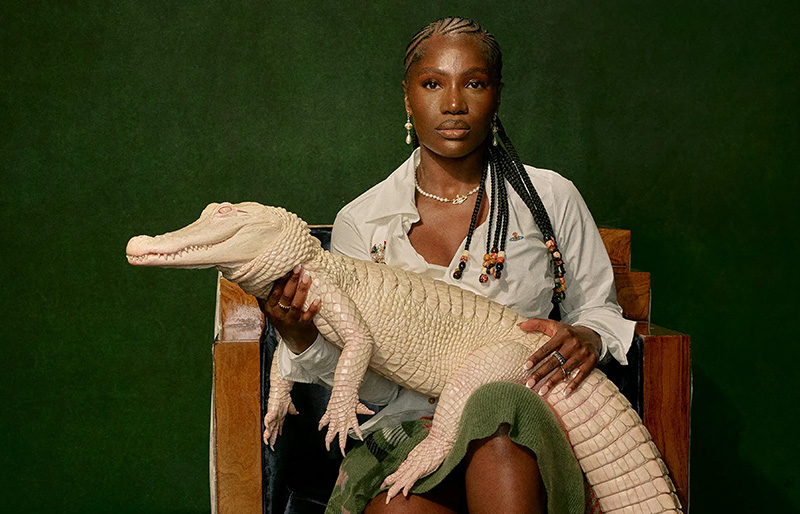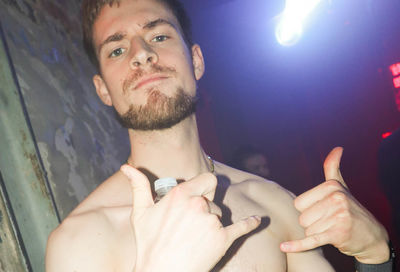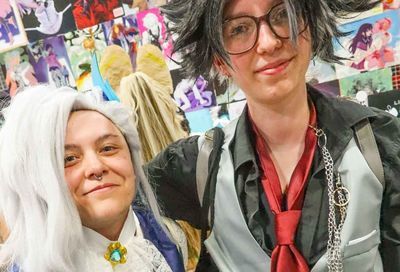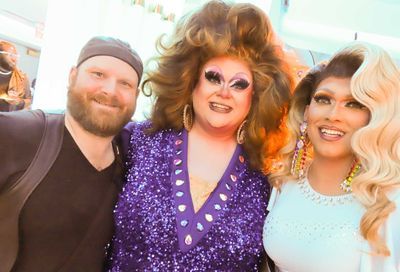Evolving Pride
The 2007 Capital Pride comes with some big changes as it embraces community spirit
EVEN AFTER THREE decades, there’s one thing you can say about Pride — it keeps on changing. Since its beginnings in Dupont Circle, D.C.’s annual celebration of gay, lesbian, bisexual and transgender people has never simply stayed the same.
Some years the location has changed. Other years, the name has changed. And every year, the number of people who attend has changed — there are more of us all the time.
For 2007, Capital Pride has another big change in the works, though it’s not one you may immediately see on the festival grounds or along the parade route. This year’s change is more behind-the-scenes, yet it’s as important as any other change has been: the addition of Capital Pride’s Community Partners.
 |
”The real intent was the understanding that Capital Pride itself is a community-based event,” says David Mallory, who works for Whitman-Walker Clinic as the director of Capital Pride. The Clinic had been the sole sponsor of the event for the past few years, but this year is sharing the role with 13 Community Partners.
(A full list and profiles of all the Community Partners begins on page 53 of this Pride Guide.)
”We wanted it to be presented truly by the community,” he says of the new sponsorship structure. He notes that while Whitman-Walker had shepherded successful Capital Pride events, as a health-care organization it naturally brought a certain focus to the event. Opening Capital Pride to a slate of new partners is a way to ensure a broader range of perspectives.
”It brings new thought and creativity to the table,” he says. ”This year Capital Pride really is created by the community and not one particular organization.”
While the new process has had its challenges in managing communication and working through the learning curve of a new planning process, Mallory says the involvement of such a broad group of community organizations brought immediate benefits. Weekly planning committee meetings regularly have 30 to 35 participants, while the increased number of subcommittees have proven successful as well in both attendance and output.
 |
Some of the outgrowth of the new planning structure includes a bevy of new events. This marks the first year that Capital Pride hosts its first trans-specific event, Trans Pride 2007 on Sunday, June 3, from 1 p.m. to 1 a.m. at the Westminster Presbyterian Church, 400 I Street SW. Trans Pride will feature panel presentations, a health fair, and, during the evening, a dinner and awards ceremony.
Mallory also points to the addition of a Bachlorette Auction to complement the annual Bachelor Auction, and a Ms. Capital Pride Leather alongside the annual men’s leather title.
(For a full schedule of the official Capital Pride events, see page 31.)
Although there are many changes and additions to the Capital Pride schedule, you won’t notice too many big changes at the Capital Pride Festival on Sunday, June 10, on Pennsylvania Avenue between 7th and 3rd Streets NW. The festival will be starting an hour earlier this year at 11 a.m. and ending at 6 p.m. Mallory says moving the festival back one hour helps Capital Pride ”be good neighbors” with the increasing number of residents who live in the area.
While Capital Pride does not charge and admission fee, organizers are asking that people donate $5 when they arrive, which will gain them a discount on drinks and Capital Pride merchandise.
”Capital Pride is a costly endeavor produced by 14 non-profits,” says Mallory. ”I hope people will turn out for the events and festival and support Pride.”
One other change attendees may notice is a decidedly localized roster of performers on the main stage — every performer is from the D.C. area or has strong ties to the local community, from local rockers Wicked Jezebel to folk-rocker Tom Goss to headliner Crystal Waters. (For a full list of performers, see the Mainstage schedule on page 85 — for profiles of some performers, see page 91.) Regular festival goers may notice that the number of performers is somewhat reduced this year — but each performer will have more time on stage than in the past.
”It give more time for quality, give more exposure to local artists, and it doesn’t rush people off the stage,” says Mallory. He also notes with a chuckle that it will likely make life a little less stressful for the backstage managers.
While all that change is a natural and positive thing, one place where Capital Pride organizers hope you won’t see any change is in the annual Capital Pride Parade on Saturday, June 9. As in years past, the parade will kick off on P Street near P Street Beach. But as many have noticed, P Street west of Dupont Circle has been undergoing some heavy construction as of late. Not to worry, says Mallory.
”The city has said P Street will be cleared for the parade,” he says. ”It’s a priority for the local businesses and the government, and they are working to make it happen. We’ll have the room for the parade.”
All in all, Mallory says the new approach to Capital Pride has been a positive experience, and one that promises even stronger events to come.
”It’s exciting, going back to the community roots,” says Mallory. ”I’m really optimistic about the future of Capital Pride.”
For more information about Capital Pride, visit www.capitalpride.org.
Support Metro Weekly’s Journalism
These are challenging times for news organizations. And yet it’s crucial we stay active and provide vital resources and information to both our local readers and the world. So won’t you please take a moment and consider supporting Metro Weekly with a membership? For as little as $5 a month, you can help ensure Metro Weekly magazine and MetroWeekly.com remain free, viable resources as we provide the best, most diverse, culturally-resonant LGBTQ coverage in both the D.C. region and around the world. Memberships come with exclusive perks and discounts, your own personal digital delivery of each week’s magazine (and an archive), access to our Member's Lounge when it launches this fall, and exclusive members-only items like Metro Weekly Membership Mugs and Tote Bags! Check out all our membership levels here and please join us today!




